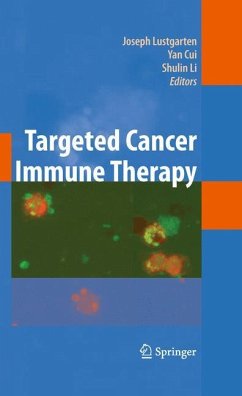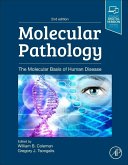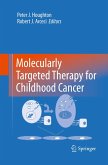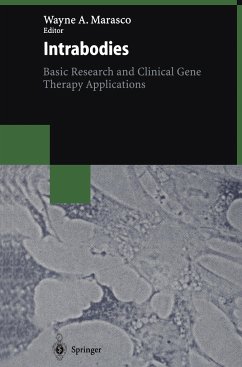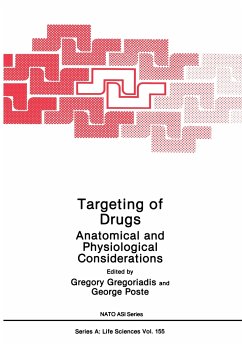The principle of cancer immune therapy remains the stimulation of the immune system to control and destroy tumors, but the scope is expanded in steady and fast pace, the approach is modernized every few years, new molecules are revealed annually, and the understanding of the mechanisms is getting deeper and deeper.
Targeted Cancer Immune Therapy covers cytokine immune therapy, cell-based immune therapy, and targeted immune therapy. In each of these three sections, only the novel aspects of immune therapy were selectively described instead of attempting to cover any historical achievement. In the first section, Cytokine Immune Therapy, the IL12 family, IL18, IL21, IL24, IL28, and IL29 were heavily discussed in regard to the anti-tumor function and application in treating tumors. In the second section, Cell-based Immune Therapy, the focus was given to engineering potent immune regulatory or effector cells such as dendritic cells, T cells, and stem cells. The cell engineering design is primarily based on the increased understanding of the interaction of tumor antigen presenting cells, antigen specific effector cells, and the tumor microenvironment. In the third section, Targeted Immune Therapy, the focus was given on rearticulating the antibody therapy for boosting immune response, which includes immunocytokines, "T-body", and tumor targeted CpG ODN. Immunocytokines represent a new class of biopharmaceuticals composed of two well known immune components - antibodies and cytokines - with the unique ability to target cytokines to the tumor microenvironment and thereby activate antitumor responses. Some or all of these innovative approaches may ultimately become the future effective immune therapy for treating malignancy.
Stimulation of the immune system's ability to control and destroy tumors cont- ues to be the goal of cancer immune therapy; but the scope has rapidly expanded; approaches are constantly updated; new molecules are continually introduced; and immune mechanisms are becoming better understood. This book has no intention of covering every aspect of immune therapy but rather focuses on the novelty of cancer immune therapy in an attempt to give readers an opportunity to absorb the new aspects of immune therapy from a single source. In this regard, three areas were selected: cytokine immune therapy, cell-based immune therapy, and targeted immune therapy. In each of these three sections, only the novel aspects of immune therapy were described instead of attempting to cover any historical achievement. In the first section, Cytokine Immune Therapy, the IL12 family, IL18, IL21, IL24, IL28, and IL29 were emphasized in regard to the an- tumor function and application in treating tumors. Most of these selected cyt- ines were discovered in last 10 years. In the second section, Cell-based Immune Therapy, the focus was engineering potent immune regulatory or effector cells such as dendritic cells, T cells, and stem cells. Cell engineering design is primarily based on the increased understanding of the interaction of tumor antigen-presenting cells, antigen- specific effector cells, and the tumor microenvironment.
Targeted Cancer Immune Therapy covers cytokine immune therapy, cell-based immune therapy, and targeted immune therapy. In each of these three sections, only the novel aspects of immune therapy were selectively described instead of attempting to cover any historical achievement. In the first section, Cytokine Immune Therapy, the IL12 family, IL18, IL21, IL24, IL28, and IL29 were heavily discussed in regard to the anti-tumor function and application in treating tumors. In the second section, Cell-based Immune Therapy, the focus was given to engineering potent immune regulatory or effector cells such as dendritic cells, T cells, and stem cells. The cell engineering design is primarily based on the increased understanding of the interaction of tumor antigen presenting cells, antigen specific effector cells, and the tumor microenvironment. In the third section, Targeted Immune Therapy, the focus was given on rearticulating the antibody therapy for boosting immune response, which includes immunocytokines, "T-body", and tumor targeted CpG ODN. Immunocytokines represent a new class of biopharmaceuticals composed of two well known immune components - antibodies and cytokines - with the unique ability to target cytokines to the tumor microenvironment and thereby activate antitumor responses. Some or all of these innovative approaches may ultimately become the future effective immune therapy for treating malignancy.
Stimulation of the immune system's ability to control and destroy tumors cont- ues to be the goal of cancer immune therapy; but the scope has rapidly expanded; approaches are constantly updated; new molecules are continually introduced; and immune mechanisms are becoming better understood. This book has no intention of covering every aspect of immune therapy but rather focuses on the novelty of cancer immune therapy in an attempt to give readers an opportunity to absorb the new aspects of immune therapy from a single source. In this regard, three areas were selected: cytokine immune therapy, cell-based immune therapy, and targeted immune therapy. In each of these three sections, only the novel aspects of immune therapy were described instead of attempting to cover any historical achievement. In the first section, Cytokine Immune Therapy, the IL12 family, IL18, IL21, IL24, IL28, and IL29 were emphasized in regard to the an- tumor function and application in treating tumors. Most of these selected cyt- ines were discovered in last 10 years. In the second section, Cell-based Immune Therapy, the focus was engineering potent immune regulatory or effector cells such as dendritic cells, T cells, and stem cells. Cell engineering design is primarily based on the increased understanding of the interaction of tumor antigen-presenting cells, antigen- specific effector cells, and the tumor microenvironment.

